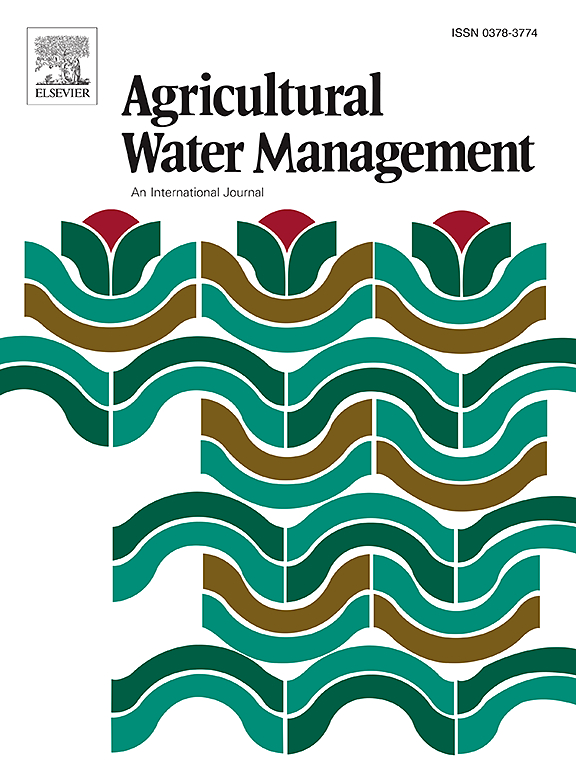Drought tolerance of melon (Cucumis melo L.) genotypes using evapotranspiration and yield components in a semi-arid environment
IF 5.9
1区 农林科学
Q1 AGRONOMY
引用次数: 0
Abstract
Increasing drought all over the world, especially in semiarid regions, has made it difficult to access clean water resources for agriculture. In water-limited environments, farmers either use wastewater to irrigate their crops or apply severely restricted irrigation techniques with scarce clean water. In this study, 20 melon inbred line genotypes, 4 cultivars were evaluated for their seasonal evapotranspiration (ET) and yield components in a field test under full irrigation (I100) and 50 % water stress (I50) conditions for two years. Seasonal ET values calculated according to the soil-water budget method ranged from 373.3 to 594.3 mm in the 1st year and from 363.6 to 603.0 in the 2nd year. Seasonal ET underwent a significant decrease in the subjects receiving 50 % water stress, which led to serious losses of yield. Indeed, water stress, decreases in yield by 39 % and 42 %, on average, were recorded in 2023 and 2024, respectively. In addition, it negatively affected agro-morphological characteristics such as fruit number, fruit weight, fruit length, fruit width, and rind thickness. On the other hand, pH and soluble solid content in melon exposed to water stress significantly increased. Sürmeli F1 (G3) and Westeros F1 (G4) hybrid varieties showed a good performance in terms of yield components under both well-watered and water deficit conditions. Moreover, in the I100 treatment, the water crop productivity (WPc) of G3 and G4 was found to be higher than that of the standard cultivars and inbred line genotypes. Under I50 conditions, however, genotype G4 achieved the highest WPc, followed by G57, G62, G70, and G58. Results of the principal component analysis (PCA) indicated that genotypes G15, G40, G37, G62, and G79 and hybrid varieties G3 and G4, which occupied the same region on the PCA plot, were identified as water-stress tolerant genotypes based on yield components.
半干旱环境下甜瓜(Cucumis melo L.)基因型的蒸散发和产量成分耐旱性
世界各地,特别是半干旱地区的干旱日益加剧,使农业难以获得清洁的水资源。在水资源有限的环境中,农民要么用废水灌溉作物,要么用稀缺的清洁水采用严格限制的灌溉技术。以甜瓜自交系20个基因型、4个品种为研究对象,在全灌(I100)和50% %水分胁迫(I50)条件下,进行了为期2年的田间蒸散量(ET)和产量组成分析。采用土壤-水预算法计算的季节ET值在第一年为373.3 ~ 594.3 mm,第二年为363.6 ~ 603.0 mm。当水分胁迫达到50% %时,季节性蒸散发显著降低,导致产量严重损失。事实上,在水分胁迫下,2023年和2024年的平均产量分别下降了39% %和42% %。此外,它对果实数量、果实重量、果实长度、果实宽度和果皮厚度等农业形态特征也有负面影响。另一方面,水分胁迫显著提高甜瓜的pH值和可溶性固形物含量。杂交品种 rmeli F1 (G3)和Westeros F1 (G4)在丰水和亏水条件下的产量构成均表现良好。此外,在I100处理下,G3和G4的水作物生产力(WPc)高于标准品种和自交系基因型。在I50条件下,基因型G4的WPc最高,其次是G57、G62、G70和G58。主成分分析(PCA)结果表明,G15、G40、G37、G62和G79基因型以及杂交品种G3和G4的产量成分均为耐水基因型,且在主成分分析样地占据同一区域。
本文章由计算机程序翻译,如有差异,请以英文原文为准。
求助全文
约1分钟内获得全文
求助全文
来源期刊

Agricultural Water Management
农林科学-农艺学
CiteScore
12.10
自引率
14.90%
发文量
648
审稿时长
4.9 months
期刊介绍:
Agricultural Water Management publishes papers of international significance relating to the science, economics, and policy of agricultural water management. In all cases, manuscripts must address implications and provide insight regarding agricultural water management.
 求助内容:
求助内容: 应助结果提醒方式:
应助结果提醒方式:


